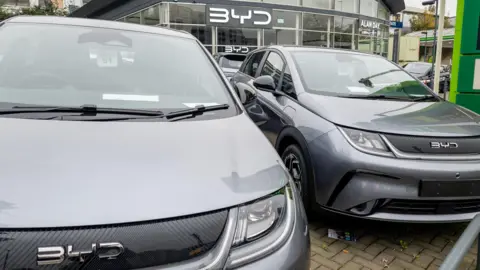The automotive landscape in the United Kingdom is undergoing significant changes, particularly concerning the increasing market presence of vehicles manufactured in China. Recent data reveals a notable trend: one in ten vehicles sold in the UK during June 2025 were produced in China. This figure highlights the escalating dominance of Chinese automotive brands, which have rapidly established themselves in the UK market.
Among the rising players in this sector are Chinese manufacturers such as BYD, Jaecoo, and Omoda. These companies, along with others like MG and Polestar, have contributed to a remarkable surge in car sales over recent months. This growth occurs at a time when most other G7 nations have imposed stricter tariffs on imported automobiles, making the situation in the UK particularly intriguing. According to statistics from the Society of Motor Manufacturers and Traders (SMMT), approximately 18,944 cars made by Chinese-owned brands were sold in June, accounting for 10% of total UK car sales and marking a significant rise from just 6% during the same month the previous year.
Examining the broader context, data from the first half of 2025 indicates that over 8%—equivalent to 1 in every 12 cars sold—were Chinese-made vehicles. This increase from 5% in previous years underscores the trend’s impact, which is primarily driven by the growing popularity of electric vehicles (EVs). Traditional industry players have raised concerns regarding the competitiveness of the UK automotive landscape against these Chinese manufacturers, suggesting that the government might need to consider imposing quotas to protect local industries.
Moreover, Chinese firms have begun acquiring local car dealerships, indicating a deeper commitment to the UK market. Former SMMT President John Neill commented on this phenomenon, suggesting that Chinese manufacturers produce vehicles that are not only superior in quality and innovation but also more affordable. Neill emphasized the necessity for Chinese firms to establish manufacturing bases within the UK to remain competitive going forward.
While the UK government has yet to adopt similar tariff strategies as those established by the EU, US, and Canada—where tariffs on electric vehicles can reach as high as 45%—it remains a topic under discussion. In contrast, Canada has moved to impose a staggering 100% tax on EVs imported from China. Negotiations between the EU and China are also ongoing, aiming to establish a minimum pricing system that could reshape the trade dynamics further. Notably, some Chinese car manufacturers are in the process of establishing factories within the EU, potentially allowing them to export vehicles to the UK without incurring tariffs.
In the realm of electric vehicles, the SMMT reports a growing trend where one in every four new car buyers in the UK opts for electric options. This shift has been motivated significantly by aggressive discounting strategies employed by manufacturers. SMMT chief executive Mike Hawes has remarked on the effect of government incentives in accelerating market transitions, drawing parallels to movements in other countries that have experienced swift advancements in the EV sector.
As the UK automotive industry navigates these changes and challenges, it faces a crucial period ahead. The competitive pressure from Chinese manufacturers paired with evolving consumer preferences—particularly toward electric vehicles—demands careful attention from policymakers, industry leaders, and consumers alike. The decisions made in the coming months could dictate the future landscape of automotive manufacturing and sales in the United Kingdom. Whether the UK can assert itself against this rising tide of Chinese automotive prowess remains to be seen.











